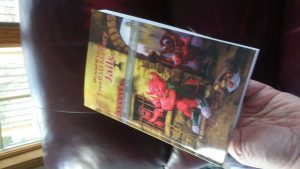As of the January issue, the FreeBSD Journal will be free. You can access it, and all back issues, through a browser. You’ll need to register for it–the Foundation is still using it for fund-raising, but in a less direct manner.
So it’s probably time for me to confess: last year I got suckered into writing a letters column for them. I, of course, wanted to call it “Letters to ed(1),” but the board got all prosaic and went with “We Get Letters.”
What sort of letters column would I write?
Here’s the first.
Hi Michael,
We were brainstorming column ideas for the FreeBSD Journal, and Kode Vicious suggested that you might be willing to handle a “Letters” column for us. People would submit their questions to the Journal, and you’d answer them for us. Any chance you’d be interested?
Best,
George V Neville-Neil
FreeBSD Foundation President
Hi George,
This is a terrible idea. It’s just awful. This is the
Internet age. Nobody reads letters columns, advice columns, or anything like
that. We have Stack Exchange, and all kinds of places for people to beg for
advice.
FreeBSD has a whole bunch of places where users can go to
get specific help. Help ships with the system, in the man pages. Where a bunch
of Unix-like operating systems made this absurd decision to bundle manual pages
separately, FreeBSD ships with the manual. Actually, you can’t not install the manual. You could build
a FreeBSD that doesn’t include the manual, of course, but to do that means
reading a whole bunch of man pages.
People say that the manual isn’t a tutorial, and they’re
right. That’s why FreeBSD has the Handbook and a whole bunch of articles.
Unlike the man pages, you can choose to not install those on a FreeBSD host.
You can browse all of the documentation online at https://docs.freebsd.org, though.
New users can start with the FAQ (Frequently Asked
Questions) file, which contains literally dozens of questions and answers. It
goes into everything from hardware compatibility to ZFS, and while some of the
gags in “The FreeBSD Funnies” have aged dreadfully—nothing scratches in memory
banks these days, they fixed that bug back in 1996—the rest of the document is
rock-solid. Looking at it now, I realize just how useful it is to new users. I
still remember that feeling of enlightenment when I understood why du(1) and
df(1) give different answers for disk space usage. Setting aside an hour to
read the FAQ will give new users that enlightened feeling over and over again.
Then there’s the Handbook. It’s broken up by tasks. If a
user’s question has a little more depth than what’s in the FAQ, the Handbook is
there for you. Some of the material orients the reader, and is well worth
reading so that new FreeBSD administrators understand why there’s so much in
/usr/local when everybody else just dumps everything in /etc and /bin.
Plus there’s all sorts of FreeBSD-related sites these days.
Even my blog has some FreeBSD tutorials on it.
If anyone did write in for help, it would be because they
didn’t use these resources.
==ml
Michael,
Not necessarily. People do have problems that aren’t yet documented. We really think a letters column could be useful addition to the Journal, and that you’re the right person to write it.
Best,
George
George,
Okay, let’s talk about the those folks who have issues that
truly aren’t in the Handbook.
Back when I started with FreeBSD, you got help via the
FreeBSD-questions@FreeBSD.org mailing list. And it’s still around today. The
people on that list want to answer questions. They subscribe specifically so
they can help people with their issues. Those brave people volunteer their time
to answer user questions. What can I do that those heroes can’t?
For those young punks who’ve forgotten how email works,
there’s a FreeBSD forum at https://forums.freebsd.org. Unlike the mailing list,
the forums are broken up by category. Users can delve into detailed discussions
of installation, storage, hardware, packages, or whatever. Whenever I look at
the forums, I find interesting discussions.
There’s a quarter century of problem-solving in the mailing
list archives. What can I say that hasn’t been said many times over?
These channels are really suitable for issues with
particular hardware. The Handbook and FAQ are permanent fixtures in the FreeBSD
ecosystem—they’ve been around for decades. But if some chipset in your
brand-new knock-off laptop is causing you grief, you can search the mailing
list or the forum to see if anyone else has that same issue with that hardware.
Users who can’t be bothered to DuckDuckGo the mailing list
archives or search the forums certainly aren’t going to bother composing a
coherent letter to me.
==ml
Michael,
Seriously, there’s people out there who have problems that aren’t in the Forums or mailing list archives yet. You really could help them. When they see how helpful you are, it might even encourage them to buy your books.
Best,
George
Dang it, George, you just don’t give up, do you?
Okay, fine. Let’s walk this through.
A user has a problem. A truly unique problem, that doesn’t
appear anywhere in the mailing list archives, the forums. The only reference on
the Internet to a problem even vaguely like this is on a darknet site and in
Siberian. They’re sincerely and honestly in trouble.
Before anyone could help this user, they’d need to describe
their problem in a useful way. This means they’d have to send a complete
description of the problem. Most people who compose a request for help can’t be
bothered to give the output of “uname -a” and a copy of dmesg.boot. They can’t
trouble themselves by giving actual error output or the contents of
/var/log/messages. Or they “helpfully” strip out stuff they think is
irrelevant, like the messages saying “PHP is dumping core” that appear all
through their web server logs.
And that’s another thing. People want help with stuff that
has no relevance to FreeBSD. They know it has nothing to do with FreeBSD. And
yet they send a message to a FreeBSD mailing list? I mean, that’s just rude.
And speaking of rudeness—would it hurt people to be polite
when they ask for help? Anyone on the mailing list or the forum who takes time
to help a user is volunteering their own time. They have better things to do
than to put up with your tantrum. I mean, I get that computers can really
torque people off. I myself have more than once stood on a rooftop and screamed
foul obscenities at the buffer cache—who hasn’t? But there’s no need to take
that out on someone who’s trying to help you.
Most often, the mere act of writing the problem description
is enough to make my own brain to solve the problem.
And nothing short of high voltage would encourage people to
buy my books.
So, no. Let users with trouble go to the mailing lists or
the Forums. I have enough to do.
==ml
Michael,
We’ll only send good letters. I promise.
Best,
George
No. No, no, no.
NO.
Do you have any idea how many books I still have to write in
my lifetime?
Ain’t gonna. Can’t make me.
==ml
We’ll pay you in gelato.
George
George,
Curse you. I’m in.
But tell Kode Vicious that if he drops my name again, he’s
going home in a bucket.
==ml
Questions?
Contact letters@freebsdjournal.org. Letters will be answers in the order that they enlighten or amuse the columnist.
Michael W Lucas has been a sysadmin for over twenty years. His latest books include “SSH Mastery, 2nd edition,” “Ed Mastery,” the third edition of “Absolute FreeBSD,” and “git commit murder.” Learn more at https://mwl.io.







